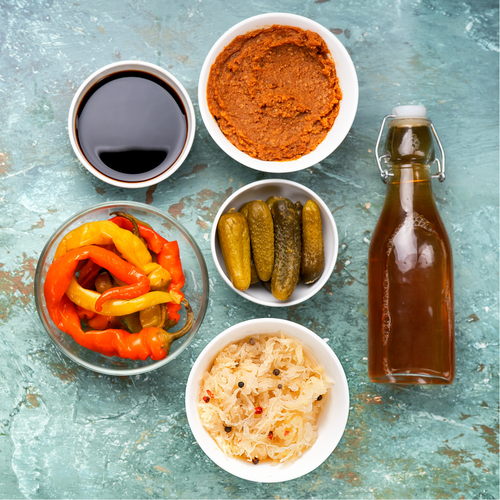Pregnancy is a special time in a woman's life; the body changes, and minor aches and pains can appear during these 9 months. Certain pains, especially in the stomach, can worry the mother-to-be. So, to help you experience this pregnancy with peace of mind, we'll explain everything about the causes of stomach pain during pregnancy and give you some tips to feel better.
What is the intestinal microbiota?
Every individual is home to colonies of microorganisms: microbiota of the intestine, mouth, vagina, lungs or skin. The most important of these is the intestinal microbiota with 100 trillion bacteria belonging to more than 200 different species ! Since 2006, scientific discoveries have proven that the intestinal microbiota plays a major role in health (immune system, metabolic functions, digestion, mental health, etc.). The stomach is also called the second brain. Probiotics are the good bacteria that colonize the intestines and are essential for their proper functioning. During pregnancy, this microbiota can be weakened and cause pain, which is why it is important to take care of it.
What are the different types of stomach aches during pregnancy?
1 - Stomach ache related to digestion
As the uterus increases in size and the baby grows over the next nine months, the digestive organs become compressed, causing some digestive disruptions. In addition, the high progesterone levels during this period also slow down bowel movements. Many pregnant women complain of constipation, bloating, or heartburn.
2 - Ligament pain linked to hormonal changes
These pains are specific but can worry the expectant mother, especially in early pregnancy. They feel like pulling in the lower abdomen, groin, and pelvis, and are caused by hormonal changes. The ligaments relax to allow the baby to make its way through.
3 - Muscle pain related to contractions
The uterine muscles are put under strain during this period. The uterus enlarges, relaxes, contracts, and painful spasms may occur.
Natural solutions for stomach pain during pregnancy
1 - Good food hygiene against stomach ache during pregnancy 🍓
If you're prone to bloating , you'll want to avoid carbonated drinks and fermented foods, such as cabbage and dairy products. If you're constipated, you'll want to eat more fiber, such as whole grains, prunes, and fresh vegetables. If you're concerned about heartburn and acid reflux, you'll want to eat smaller meals and avoid fatty and spicy foods.
2 - Good hydration to prevent stomach ache during pregnancy 💧
Drinking at least 1.5 liters of water per day helps combat constipation and urinary problems, such as cystitis, which can occur during pregnancy. By drinking plenty of water, you urinate more and germs stagnate less in the bladder.
3 - Stay active to prevent stomach ache while pregnant 🧘🏼♀️
If your condition allows, with your doctor's approval, it's important to stay active during this time to ensure good digestion. Walking, swimming, or yoga are good physical activities to practice while pregnant.
4 - Food to relieve stomach ache during pregnancy 🧫
Consuming probiotics in your diet through fermented products as well as a sufficient quantity of fiber, through fruits and vegetables, cereals and legumes, will help support digestive health for better daily comfort.
Other benefits of probiotics during pregnancy
1 - Pass on to the child a capital of good bacteria which will promote the development of his own microbiota
In the mother's womb, the baby's digestive tract is sterile, and in the hours and days following birth, it becomes colonized by billions of bacteria. It is during the first three years of life that the child builds its intestinal microbiota. The development of the intestinal flora will depend on the baby's diet, but also on the mother's flora. Taking probiotics during pregnancy, and especially during the last trimester, will have a beneficial impact on the mother's intestinal flora, as well as on the development of the child's intestinal flora.
2 - Prevent the appearance of allergies in children
Taking probiotics during pregnancy and for infants limits the risk of atopic eczema until the age of 4. Eczema is a major issue since it is known to be a precursor to asthma and food allergies!
3 - Limit mycoses and cystitis
During pregnancy, some women regularly develop yeast infections and cystitis. Probiotics for intimate flora help strengthen vaginal flora and contribute to its barrier action against vaginal infections. Find our probiotics for yeast infections and cystitis here.
4 - Reduce the risk of gestational diabetes
Gestational diabetes occurs in pregnant women and is the stage where the body becomes more resistant to insulin, making it harder to eliminate excess glucose from the blood. Gestational diabetes affects 1 in 10 pregnancies and can cause a range of health problems for both the mother and the newborn. A study published in the British Journal of Nutrition showed that taking probiotics during pregnancy could prevent the risk of gestational diabetes in 2/3 of women : 6.5% of women who took the placebo developed gestational diabetes, compared to 2.1% of expectant mothers who took the probiotic, or 68% fewer women. Why? Probiotic supplementation in women with gestational diabetes can significantly reduce insulin resistance. Overall, taking probiotics during pregnancy improves blood sugar control . According to a Norwegian study published in the medical journal BMJ Open, which followed 70,149 healthy women between 1999 and 2008, including 37,050 who were giving birth to their first child, women who took probiotics during pregnancy had better glucose tolerance and better control of their blood sugar.













